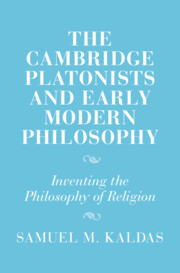Book contents
- The Cambridge Platonists and Early Modern Philosophy
- Cambridge Studies in Religion and Platonism
- The Cambridge Platonists and Early Modern Philosophy
- Copyright page
- Dedication
- Contents
- Acknowledgements
- Note on the Text
- Abbreviations
- Introduction: The Cambridge Platonists and Philosophy of Religion
- Part I The Origins of Cambridge Platonism
- 1 Learned and Ingenious Men
- 2 ‘Plato and His Scholars’:
- 3 Puritanism and Predestination
- 4 Cambridge Platonists versus Cambridge Calvinists:
- Part II Rival Conceptions of God and Goodness:
- Part III The Religious Epistemology of the Cambridge Platonists
- Conclusion: The Cambridge Platonists as Early Modern Christian Platonists
- References
- Index
3 - Puritanism and Predestination
from Part I - The Origins of Cambridge Platonism
Published online by Cambridge University Press: 09 May 2024
- The Cambridge Platonists and Early Modern Philosophy
- Cambridge Studies in Religion and Platonism
- The Cambridge Platonists and Early Modern Philosophy
- Copyright page
- Dedication
- Contents
- Acknowledgements
- Note on the Text
- Abbreviations
- Introduction: The Cambridge Platonists and Philosophy of Religion
- Part I The Origins of Cambridge Platonism
- 1 Learned and Ingenious Men
- 2 ‘Plato and His Scholars’:
- 3 Puritanism and Predestination
- 4 Cambridge Platonists versus Cambridge Calvinists:
- Part II Rival Conceptions of God and Goodness:
- Part III The Religious Epistemology of the Cambridge Platonists
- Conclusion: The Cambridge Platonists as Early Modern Christian Platonists
- References
- Index
Summary
This chapter provides essential historical and theological background for the emergence of Cambridge Platonism. It traces the fortunes of the Calvinist or Reformed (or less accurately ‘Puritan’) theological community in England, of which the Cambridge Platonists were members, through the civil wars and Interregnum, with a particular focus on controversy about predestination. It presents the major outlines of the Reformed doctrines of double predestination, election and reprobation, along with the rise of anti-Calvinist currents of thought like Arminianism and Laudianism, with a view to exploring the ways in which these theological disputes contributed to political tensions that gave rise to the civil wars. Finally, it explores the central role played by the Cambridge Platonists’ colleges of Emmanuel and Christ’s in the training of Reformed preachers and the dissemination of Reformed doctrine, with particular attention paid to Reformed attitudes to the study of philosophy and pagan thinkers such as Plato and Aristotle.
Keywords
- Type
- Chapter
- Information
- The Cambridge Platonists and Early Modern PhilosophyInventing the Philosophy of Religion, pp. 61 - 87Publisher: Cambridge University PressPrint publication year: 2024

